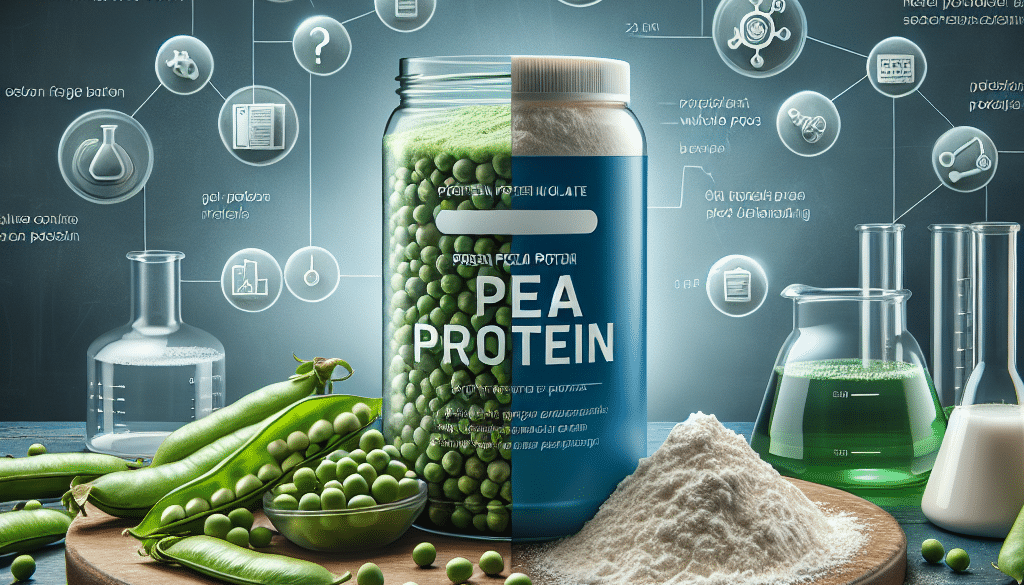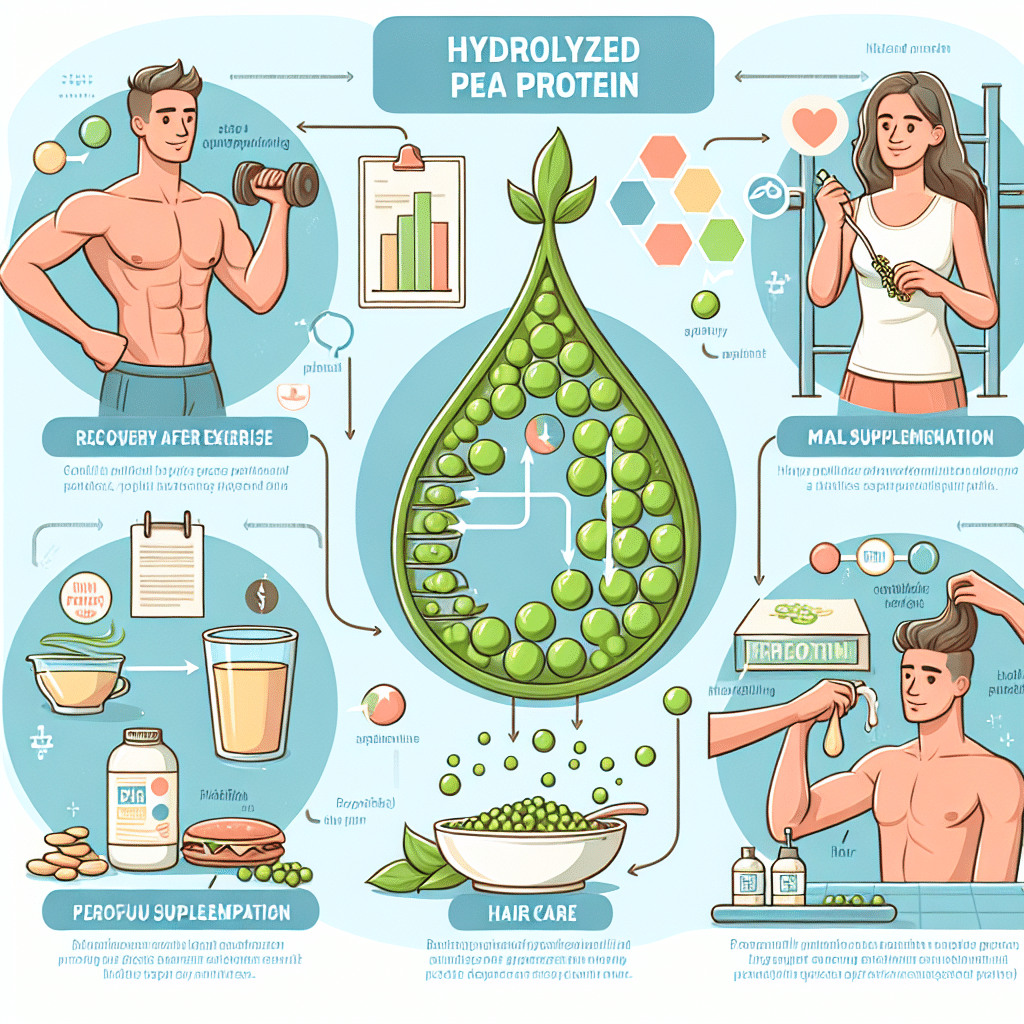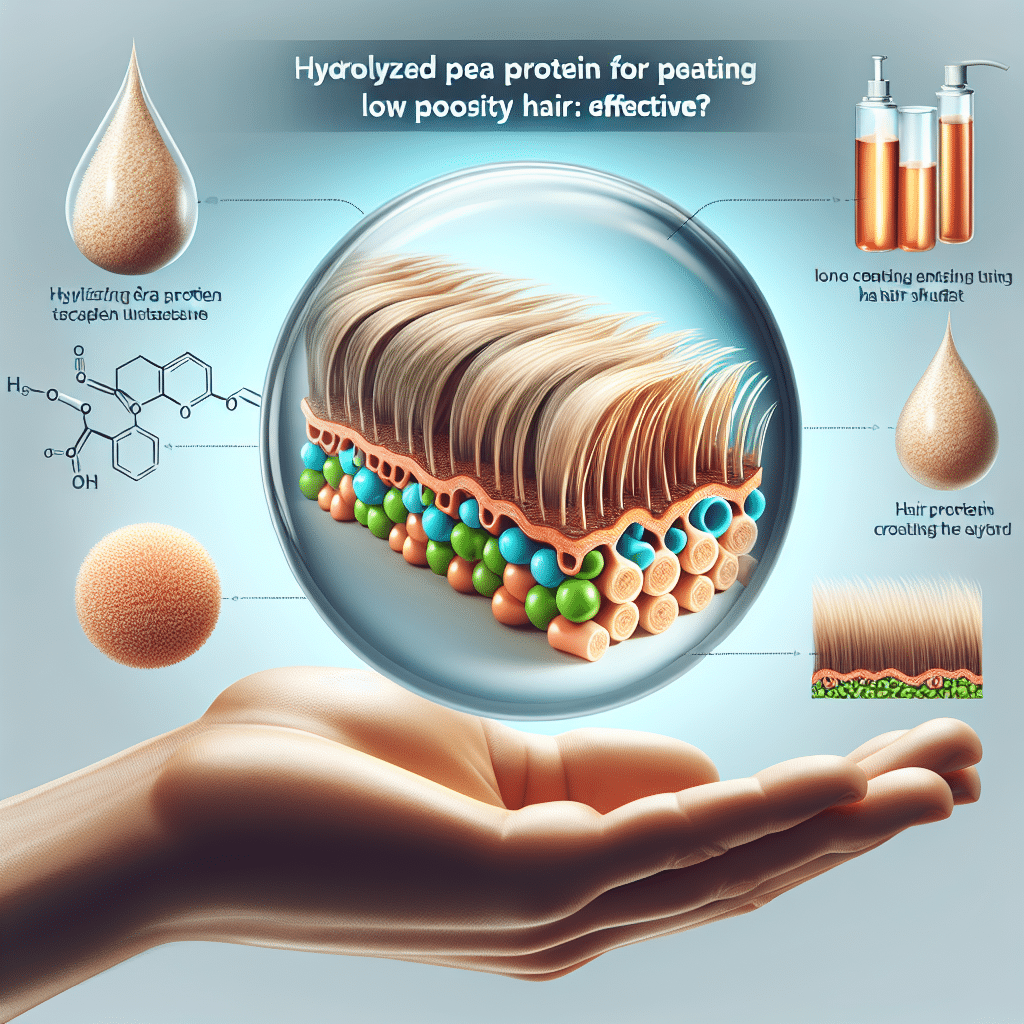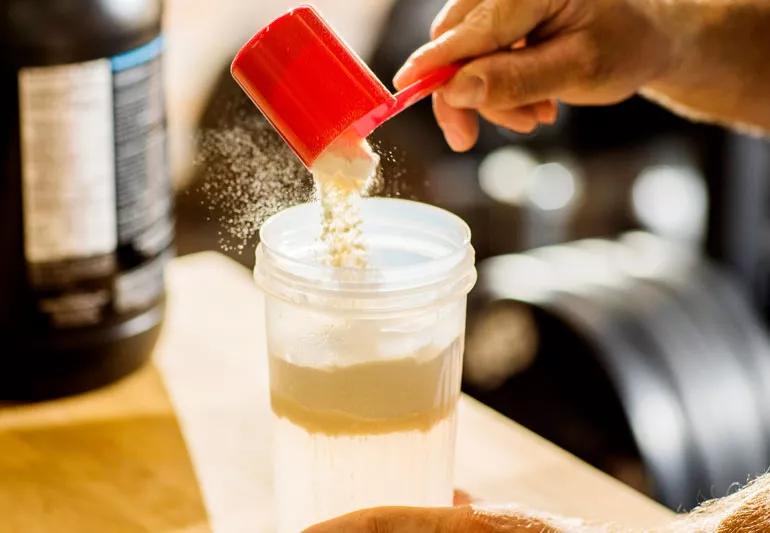Unlocking the Power of Hydrolyzed Pea Protein: A Nutritional Marvel
In the world of health and wellness, protein remains a cornerstone of balanced nutrition, and the quest for sustainable, plant-based protein options has led to a rising star—hydrolyzed pea protein. Derived from yellow peas, this powerhouse ingredient is taking the spotlight for its nutritional value, versatility, and suitability for various dietary needs. Let’s explore why hydrolyzed pea protein is making waves and how it can transform health, fitness, and even food innovation.
In the world of health and wellness, protein remains a cornerstone of balanced nutrition, and the quest for sustainable, plant-based protein options has led to a rising star—hydrolyzed pea protein. Derived from yellow peas, this powerhouse ingredient is taking the spotlight for its nutritional value, versatility, and suitability for various dietary needs. Let’s explore why hydrolyzed pea protein is making waves and how it can transform health, fitness, and even food innovation.
What Is Hydrolyzed Pea Protein?
Hydrolyzed pea protein is a highly refined form of pea protein, produced through a process that breaks down the protein into smaller chains of amino acids, known as peptides. This hydrolysis process enhances digestibility, allowing for faster absorption and utilization by the body.
Unlike many protein sources, hydrolyzed pea protein is hypoallergenic, making it suitable for people with common food sensitivities such as lactose, gluten, or soy. Its clean label credentials and neutral taste also make it a favorite among food manufacturers and health-conscious consumers alike.

The Hydrolysis Process
The production of hydrolyzed pea protein involves several steps:
1. Isolation: Peas are ground and mixed with water to create a slurry. The protein is then separated from the fiber and starch.
2. Enzymatic Hydrolysis: Specific enzymes are introduced to break down the protein into smaller peptides and amino acids.
3. Purification: The hydrolyzed protein is filtered and purified to remove any impurities and unwanted components.
4. Drying: The purified protein solution is dried into a powder form for easy use in various applications.
This process results in a protein powder that is not only easy to digest but also has a reduced potential for causing allergies, making it an excellent choice for individuals with dietary restrictions.

Properties of hydrolyzed pea protein
1. This type of hydrolyzed pea protein has a number of properties that bring great benefits to those who consume it, it has a high protein content, with a sufficient dose of amino acids that the body requires, such as BCAA.
2. This protein is totally vegetable, without additives, nor substances that come from any animal race, and even so it offers the protein levels that other products of animal origin offer.
3. The hydrolyzed pea protein is highly hypoallergenic, its consumption does not produce any allergies, it is an advantage over protein from other sources such as seafood, dairy, soybeans, wheat, etc.
4. It is a gluten-free protein, this element is one of the causes of many types of allergies, it also has no lactose, since it is not generated by any dairy source, being free of the harmful sugars of milk.
5. It is a protein that is easily digested, and does not present any type of contraindication, it has a very low content of sugars and fats.

The Nutritional Benefits of Hydrolyzed Pea Protein
1. Rich in Essential Amino Acids: Hydrolyzed pea protein contains all nine essential amino acids required by the human body, making it a complete protein. This includes a notable amount of branched-chain amino acids (BCAAs) like leucine, isoleucine, and valine, which are crucial for muscle repair and growth.
2. Improved Digestibility: The hydrolysis process reduces the size of protein molecules, making them easier for the body to digest and absorb. This makes hydrolyzed pea protein an excellent option for those with sensitive digestive systems or conditions that affect nutrient absorption.
3. Supports Muscle Development and Recovery: Thanks to its high-quality protein content, hydrolyzed pea protein is a great ally for athletes and fitness enthusiasts. It promotes muscle synthesis, aids recovery after intense workouts, and supports overall strength.
4. Heart Health Benefits: Studies have shown that pea protein may help reduce blood pressure and cholesterol levels, contributing to improved heart health. Its low fat and cholesterol-free profile further enhances its cardiovascular benefits.
5. Weight Management: Hydrolyzed pea protein helps regulate appetite by promoting a feeling of fullness. This can support weight management efforts by reducing unnecessary snacking or overeating.

Applications of Hydrolyzed Pea Protein
Hydrolyzed pea protein has a wide range of applications in the food and beverage industry:
1. Sports Nutrition: It’s commonly found in protein shakes, bars, and supplements aimed at athletes and fitness enthusiasts.
2. Dairy Alternatives: Pea protein is used in plant-based milk, cheese, and yogurt, providing a creamy texture and nutritional boost.
3. Meat Substitutes: Its ability to mimic the texture of meat makes it a key ingredient in vegetarian and vegan meat alternatives.
4. Baked Goods: It can enhance the protein content and texture of bread, cookies, and other baked products.
5. Convenience Foods: Ready-to-eat meals and snacks often incorporate pea protein to improve their nutritional profile.
The versatility of hydrolyzed pea protein allows it to be easily incorporated into a variety of products, catering to the growing demand for plant-based and protein-rich foods.
Hydrolyzed Pea Protein: The Secret Solution for Radiant Hair and Skin
Hydrolyzed pea protein is a natural emollient and hair conditioning agent in cosmetics. As the name suggests, it’s a product produced when protein extracted from peas is hydrolyzed, meaning that it has gone through a transformation breakdown using enzymes or water.
In addition to serving as an emollient, hydrolyzed pea protein also functions as a surfactant, meaning it captures dirt and permits it to be rinsed from skin. Because of its plant-based origins, hydrolyzed pea protein is considered one of the more environmentally friendly forms of surfactants used in cosmetics.
Hydrolyzed pea protein has been ruled safe in its current usage in hair and skin care. When used on its own, the typical concentration is 0.5–1.5%, depending on formulary needs.

Why Choose Hydrolyzed Pea Protein Over Other Proteins?
Plant-Based and Sustainable: Hydrolyzed pea protein is a 100% plant-based option, making it an excellent choice for vegetarians, vegans, and environmentally conscious individuals. The cultivation of yellow peas requires less water and fewer resources compared to animal-based protein sources, reducing its carbon footprint.
Free from Common Allergens: Unlike whey or soy protein, hydrolyzed pea protein is free from allergens such as lactose, gluten, and soy. This makes it a safe and reliable option for people with dietary restrictions.
Neutral Flavor Profile: With its mild, neutral flavor, hydrolyzed pea protein can be easily incorporated into a variety of recipes without altering taste. From smoothies and protein bars to baked goods and savory dishes, it’s a flexible ingredient.

Environmental Impact and Sustainability
One of the most compelling reasons for the rise in popularity of hydrolyzed pea protein is its environmental sustainability. Peas require less water and fertilizer than many other crops and can fix nitrogen in the soil, reducing the need for chemical fertilizers. Additionally, pea protein production has a lower carbon footprint compared to animal-based proteins, making it a more eco-friendly choice.
Case Studies and Statistics
Several studies have highlighted the benefits of pea protein. For instance, a 2015 study published in the Journal of the International Society of Sports Nutrition found that pea protein promoted muscle thickness gains just as effectively as dairy-based whey protein in athletes. Moreover, market research indicates a growing trend in plant-based protein consumption, with the global pea protein market expected to reach significant growth by 2025, according to a report by Grand View Research.
Incorporating Hydrolyzed Pea Protein Into Your Diet
Whether you’re an athlete looking to optimize performance, a busy professional aiming for balanced nutrition, or someone embracing a plant-based lifestyle, hydrolyzed pea protein offers unmatched versatility. Add it to smoothies, mix it into pancake batter, or use it as a base for soups and sauces. With endless possibilities, it’s never been easier to prioritize your health and wellness.

Where to Buy Hydrolyzed Pea Protein?
Discover the exceptional quality of Hydrolyzed Pea Protein from YANGGE BIOTECH INGREDIENTS, available with a complimentary sample at yanggebiotech.com. Renowned as an industry leader, YANGGE BIOTECH is dedicated to manufacturing and distributing premium-grade dietary supplement ingredients, delivering purity and potency with every product.
Not only does YANGGE BIOTECH serve health-conscious consumers directly, but it also partners with top brands across the food and supplement sectors, supplying raw, pure ingredients that meet the highest industry standards. Elevate your product offerings or personal wellness with our trusted ingredients—reach out to us today to place your order and experience the YANGGE difference.
Wrapping up, Hydrolyzed pea protein is more than just a plant-based protein—it’s a nutritional powerhouse that aligns with the values of health, inclusivity, and sustainability. Its benefits, from muscle support to heart health, make it a valuable addition to any diet.
By choosing hydrolyzed pea protein, you’re not only fueling your body but also contributing to a healthier, more sustainable planet. Isn’t it time to make the switch?
Why Choose Yangge Biotech for Hydrolyzed Pea Proteins?
Yangge Biotech is your trusted source for premium Hydrolyzed Pea Proteins. Here’s why:
Top-Quality Products: Yangge Biotech ensures the highest standards of purity and color consistency, meeting global regulatory standards for food, cosmetics, and textiles.
Sustainable and Ethical: The company is committed to eco-friendly sourcing and responsible agricultural practices, making it the go-to choice for businesses seeking a natural, sustainable colorant.
Customization: Whether you need powder, liquid, or concentrated forms, Yangge offers flexible solutions tailored to your needs.
Certified and Reliable: With certifications like GMP, ISO, and Kosher, you can trust the safety and quality of every batch of Carthamus Red.
Global Reach, Excellent Service: With a strong global presence and exceptional customer support, Yangge Biotech ensures a smooth, hassle-free experience from start to finish.
Discover the vibrant power of Hydrolyzed Pea Proteins with Yangge Biotech – where top-notch quality, sustainability, and a customer-first approach come together to elevate your experience!
References:
International Journal of Toxicology, August 2022, pages 5S-20S
Journal of Surfactants and Detergents, July 2011, ePublication
Molecular Nutrition & Food Research, October 2001, pages 408-411pdf
Send Inquiry
Related Industry Knowledge
- what is the difference between blue spirulina and pea powder?
- Can Yeast Extract Beta Glucan Powder Help with Stress and Anxiety?
- Understanding Yeast Extract Beta Glucan Powder
- BUTTERFLY PEA POWDER
- Effects of Creatine Tablets in Different Forms
- Can Pure Borage Oil Use in Pregnancy
- Organic Chlorella Tablets Benefits for Skin
- Blue Foods: A Hidden Delight or an Acquired Taste?
- Gardenia Yellow Powder E60 Uses in Food, Beverage & Nutrition
- is magnesium taurate good for high blood pressure?



